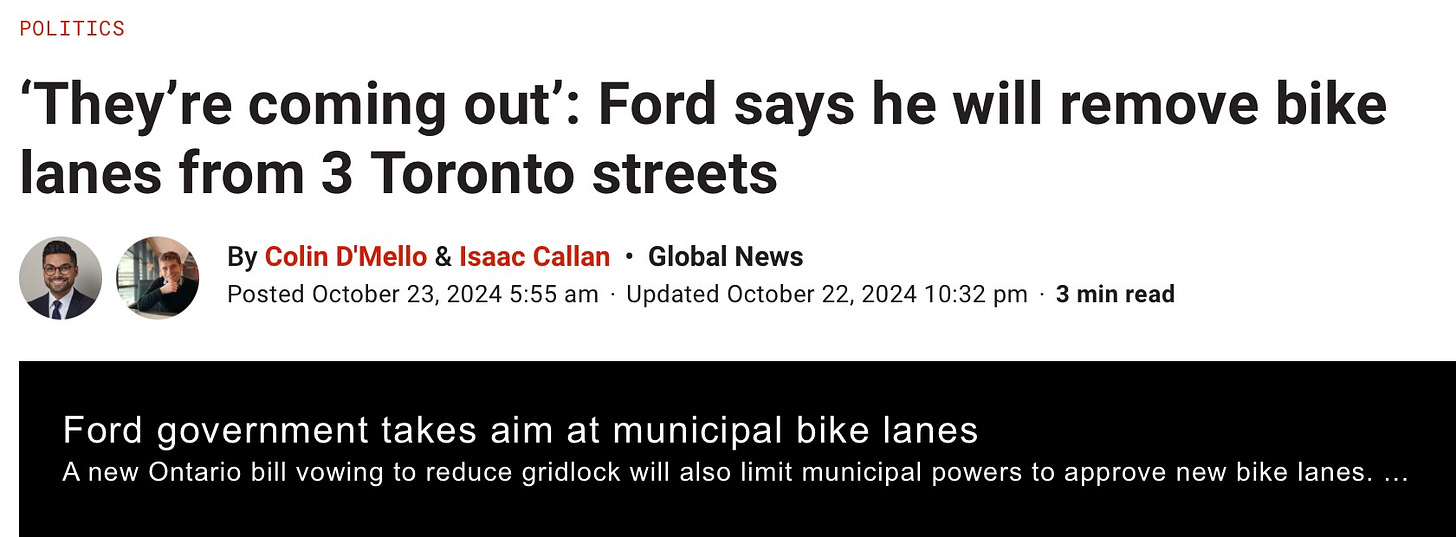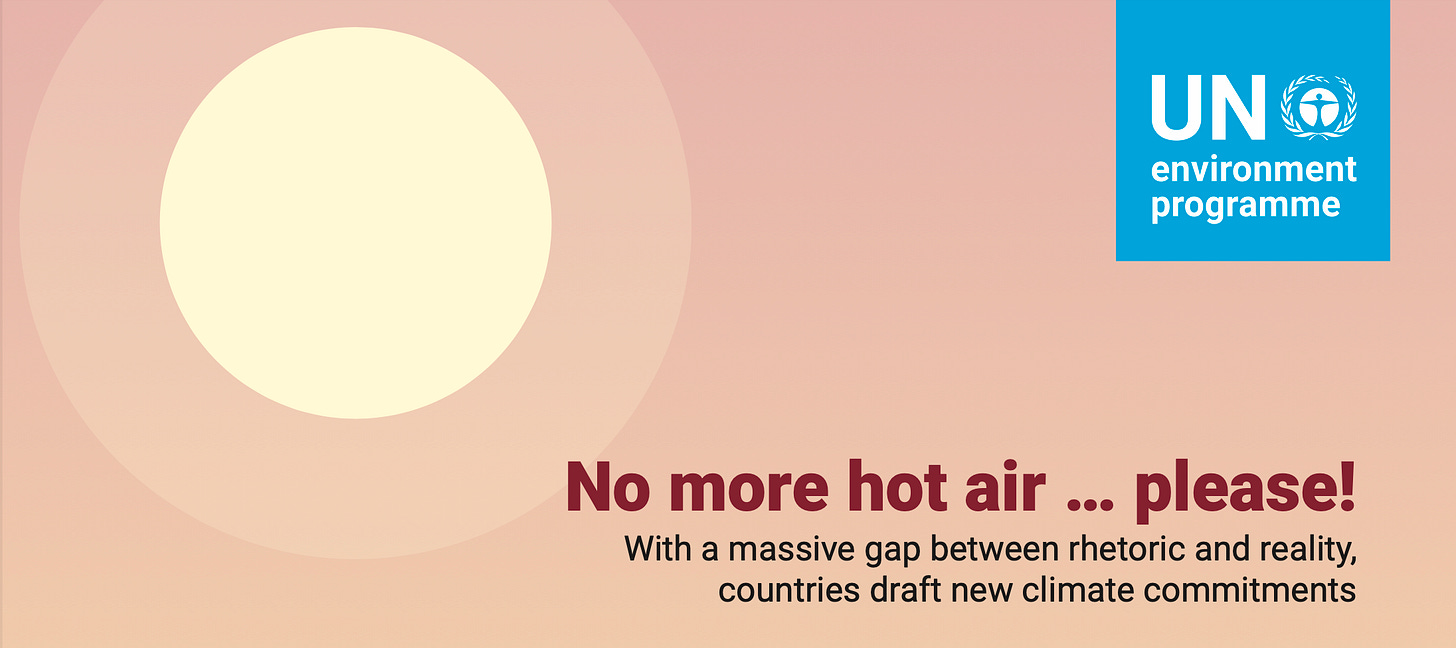Mind the emissions gap, it's getting wider
We could fix this if we had the will, and if we put climate ahead of cars. But we keep voting for the latter over the former.
Every year, the United Nations Environment Program releases its Emissions Gap report, with this year’s being subtitled “No more hot air…please!” The report looks at the difference between the reductions needed to keep the global temperature rise below 1.5 or 2 degrees Celsius and the commitments nations have made with their Nationally Determined Contributions (NDCs) or promises made as part of the Paris Agreement. That’s the emissions gap. If we don’t close the gap, we could be looking at a 3.1°C rise in average temperature.
Inger Andersen, Executive Director of UNEP, says in a press release:
“Climate crunch time is here. We need global mobilization on a scale and pace never seen before – starting right now, before the next round of climate pledges – or the 1.5°C goal will soon be dead and well below 2°C will take its place in the intensive care unit.”
Note that she doesn’t say that the 1.5°C goal is dead. I don’t either because it is still possible to meet the goal. All we have to do is massively deploy solar, wind and other renewables (26% of emissions come from power generation) and stop burning fossil fuels for buildings and transportation (27%), which we can do with heat pumps and electric vehicles. Work has to be done with steel, concrete and agriculture. I always push the SER framework: “sufficiency, efficiency, and renewables.”
It would all be doable if there was the will.
The problem is, there isn’t much will. I often quote climate journalist Amy Westervelt, who wrote earlier, “The only real obstacles are politics and fossil fuel interests.” But citizens vote for those politicians, and many are happy to vote for “drill, baby drill” candidates who deny or downplay the climate crisis as long as they can keep driving.
In Ontario, Canada, where I live, the government is single-minded in its pandering to people who drive cars, primarily to single-family houses in sprawling suburbs; every move Premier Doug Ford makes is about the War on Cars, a term coined by his late brother Rob, the former crackhead mayor of Toronto. His latest bright idea is to go after Toronto’s bike lanes that slow down his drive to the office.
This comes after ramming a new highway through the greenbelt, lowering the tax on automotive fuel, raising speed limits on highways, eliminating licence plate renewal fees, and proposing an insane multi-billion dollar tunnel across the city to double highway capacity. He knows his voters; they love it. I suspect that if an election were held today he would win with a landslide.
Federally, the New Democratic Party that I have voted for all my life is rethinking its support of carbon taxes, losing the vote of this pinko cyclist forever. The Conservatives will likely win the next election, with a leader who wears “axe the tax” T-shirts.
Because people care more about cars than about carbon.
In the USA, Donald Trump is promising gas at US$1.87, the price at the depth of the pandemic when nobody was driving anywhere and many oil and gas companies went bankrupt. For some reason, Americans remember the economy as being better under Trump, when it was a deflationary basket case; now he might be reëlected in part because of promises to remove taxes on everything from tips to overtime. His latest is to party like it’s 1899 and eliminate income taxes altogether.
All of which brings us back to the Emissions Gap report. Inger Andersen doesn’t want cheap gas, more highways, and eliminating carbon taxes; she wants countries to step up and do more.
“I urge every nation: no more hot air, please. Use the upcoming COP29 talks in Baku, Azerbaijan, to increase action now, set the stage for stronger NDCs, and then go all-out to get on a 1.5°C pathway.”
The report focuses on the NDC commitments because they are due for updates scheduled in the Paris Agreement for February 2025. But most nations have not come close to meeting their earlier commitments, and continue to pour concrete and drill for fossil fuels. The report complains that time is of the essence:
Importantly, inaction reduces the chance of bridging the emissions gap in 2030 because of continued lock-in of carbon-intensive infrastructure and less time available to realize the emission reductions required. It further adds risks of temperature overshoot and compounds increasingly severe climate impacts, some of which are irreversible.
And Doug Ford wants to build a concrete car sewer under Toronto. He is the king of carbon lock-in. Yet the report notes that unless everyone meets their commitments, we’re screwed.
The only scenario that gets closer to the temperature goal of the Paris Agreement is the most optimistic scenario, which assumes that all the most stringent pledges currently made by countries – in other words the conditional NDCs and all net-zero pledges, including those made as part of long-term low-emissions development strategies – are fully implemented.
But all anyone seems to care about is cheap gas.
People often complain about my constant talk of personal responsibility, of living the 1.5-degree lifestyle (which I missed by tonnes this year because of flying), of how a life of just enough offers a way out of the climate crisis. My critics say individual actions are pointless, and we should be pressuring governments and attacking corporations.
But we elect those governments.
It is clear, reading the emissions gap report, that the only parties at the climate table are governments, which either regulate, promote, or are owned by the fossil fuel industry.
The voting choices in the USA next week or Canada next year are also clear. Voting is the ultimate personal responsibility, the most important individual action. We have to vote for the candidate and the party that puts climate ahead of cars, that will show up with a meaningful NDC in February, and that will make the often difficult choices necessary to reduce carbon emissions.
Unfortunately, I fear that the majority of us just want fast, cheap driving.











Sadly, your last line is correct. I would love to get rid of cars. Bikes are so much more pleasant, and so is walking, especially if there are no cars. Yet we are locked in to a system that is car dependent, fully dedicated to the ideal of continuous growth, which is an economic and environmental disaster already happening. The evidence is clear. We are a ship, heading straight for a rock, while the captain and crew are looking backwards extolling the power of the propeller. Most of the passengers are staring back as well, while a few are looking ahead and screaming in a sound proof room. Ford, Trump, Orban, Putin, Netanyahu, Modi and a whole troop of other world leaders are not leading from wisdom, the are simply doubling down on the mistakes of the 1920's that lead into WWII. This time the crash will be far worse. Can we throw things into reverse? Not without a massive shift of the rudder toward reduction and alternative energy, with the emphasis on the former. China is doing the latter without reduction. 160 gigawatts of new solar in the last quarter is very impressive, but ignores the fact that the streets are crowded, albeit with an increase in the percentage of electric cars. I don't have hope that the politics will change without a collapse. That collapse is coming is clear to anyone brave enough to look ahead. Where is the politician brave enough to tell us that we need to consume less?
I could not agree more with your point about the responsibility for electing politicians who favour cars over the climate. We are almost all quick to abdicate our personal responsibility for the crises the world and we each are facing. Until and unless we change that getting onto a better path is a pipe dream. Politicians are people, governments are run by people, corporations are run by people. We forget that and treat them like some all powerful entities that act independently of all the rest of us on their own agenda over which we have no control. Very convenient when you want a scapegoat for all your problems so you can rationalize doing nothing, but complete and utter nonsense at the core. If you eat up and vote for the deluded pipe dream peddled by self serving politicians/corporate shills that there is a world with widely available good education, good social programs, good health care, good housing, good infrastructure, good (insert here all the things that make a society a decent one to live in) without everyone contributing a significant part of their working effort (directly or through taxation) to the common good you, not they, are the problem. If you keep buying/consuming whatever trashy widget and useless service corporations pump out and expect there to be no consequences to the planet/climate you, not they, are the problem. The solution is theoretically simple but it will hurt those that have the most most and they will fight tooth and nail to maintain or improve their social ranking so change won’t come without a fight (“hurt” here is mostly describing a psychological pain associated with having to accept less material wealth as sufficient and involves no actual hardship that should trouble any decent human morally). Humans rate their satisfaction with life largely against the material wealth of their neighbour (usually focusing on the injustice that allows the ones above them to have more while accepting as part of the good and natural order that they have more than their neighbour with less) regardless of how much they have themselves. This was a problem when the “world” for most people was their physical neighbour. It is a problem an order of magnitude, at least, worse in a world where the wealth of the tiny subset of the population that has the most is pressed into our faces 24/7 and they become the “neighbour” with more that we measure against. The problem is further compounded by the reality that those with the most will work incessantly to sucker those with less into jumping onto their self serving bandwagon by selling the nonsense dream that we can all have it all like them if we just work a little harder and continue to feed the machine. It is compounded again by the reality that the BS works every time at every level to make people act in ways that are not in their individual or collective interest. A politician/government can buy the vote of a significant percentage of the population (even that part that has much) by promising to improve their immediate individual lot by a few dollars (cancel vehicle license renewal fees, send out a hundred dollar tax rebate cheque, lower taxes, …) or by putting up a third party scapegoat as the source of all their ills and promising to reign in the imagined/exaggerated evil (immigrants, China, the Middle East, Muslims, Democrats, Republicans, LGBTQ..). This works again and again despite the reality that they are at the same time strangling funding for better education, social services, health care, etc. and dumping piss pots full of money down holes that lead directly into the accounts of those who already have the most. They can do it only because we keep taking the bait over and over and over again. You out number them a ten to one and without you they have nothing. You get the government/leadership you deserve. There are no excuses for doing nothing at the individual level (keep in mind that picking the Liberals over the Conservatives in Canada or DEM over GOP in the US is for all practical purposes doing nothing).